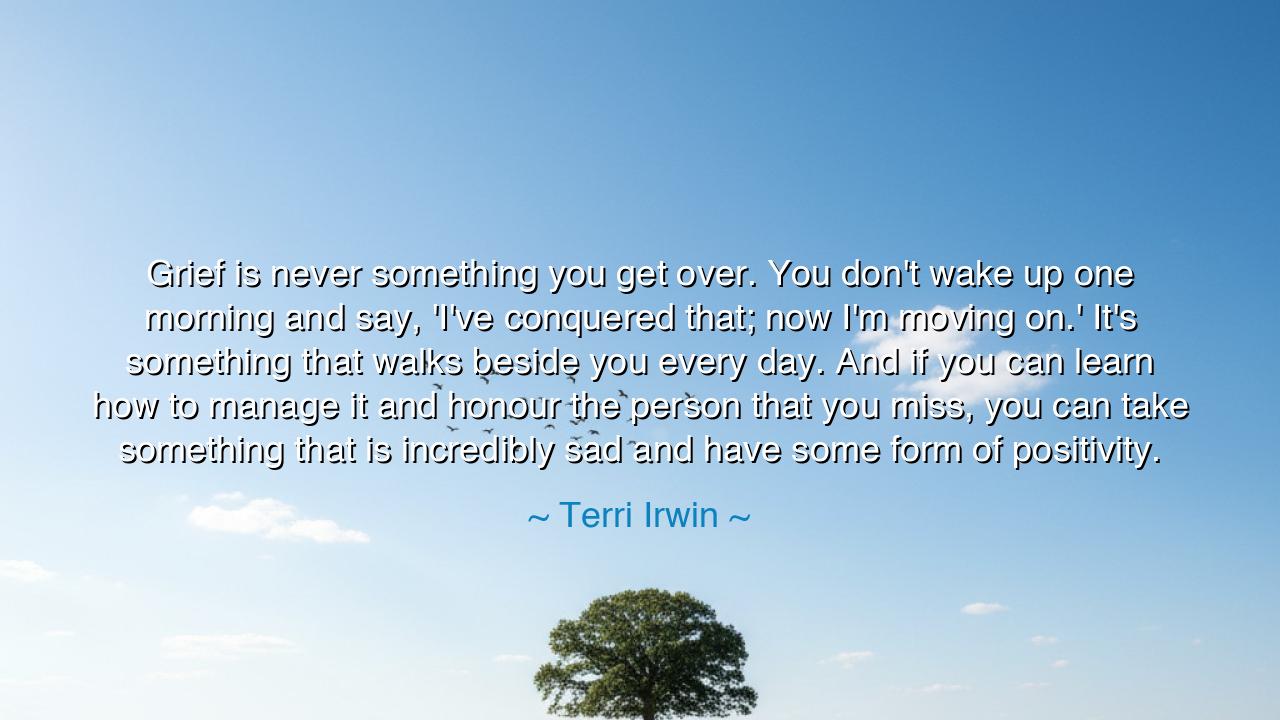
Grief is never something you get over. You don't wake up one
Grief is never something you get over. You don't wake up one morning and say, 'I've conquered that; now I'm moving on.' It's something that walks beside you every day. And if you can learn how to manage it and honour the person that you miss, you can take something that is incredibly sad and have some form of positivity.






In the gentle yet steadfast voice of Terri Irwin, who has walked through both love’s brilliance and sorrow’s shadow, there comes a truth both painful and profound: “Grief is never something you get over. You don’t wake up one morning and say, ‘I’ve conquered that; now I’m moving on.’ It’s something that walks beside you every day. And if you can learn how to manage it and honour the person that you miss, you can take something that is incredibly sad and have some form of positivity.” These words are not born of theory or philosophy, but of lived experience — the wisdom of a heart that has been broken and has chosen, still, to love. For Terri speaks as one who has lost a great light — her husband, Steve Irwin, whose spirit burned fierce and bright — and in her grief, she discovered what many before her have found: that grief is not an enemy to be vanquished, but a companion to be understood.
In the ancient world, the wise did not believe that mourning could ever truly end. The Greeks had their rituals for remembrance, the Romans their altars for the departed, and the Hebrews their psalms of lamentation — for they understood that the dead do not vanish; they dwell in memory, and memory is eternal. What Terri Irwin speaks of is this same truth, reborn in modern tongue: that grief does not fade like a wound that heals, but transforms like fire shaping metal. It changes us, teaches us endurance, and reminds us that love so deep as to cause pain is the most sacred kind of love of all.
To say that grief “walks beside you every day” is to acknowledge that it becomes part of life’s rhythm. It does not chain you, yet it never leaves you. Some days it whispers softly; other days it roars. But through time, as Terri reveals, it becomes less a weight and more a reminder — a shadow that proves there once was light. This acceptance is not weakness, but the highest wisdom. For to deny grief is to deny love itself; and to carry it with grace is to honor the life that once touched yours.
Consider the story of Queen Victoria, who, upon losing her beloved Prince Albert, wore black for forty years. The world thought her trapped in sorrow, yet within her grief she found her strength — she built hospitals, championed her people, and raised a generation of leaders under the quiet influence of remembrance. She never “got over” her loss; she learned to live with it, to turn mourning into meaning. Like Terri Irwin, she discovered that one may transform the ache of love’s absence into the fuel of purpose, allowing sadness to illuminate rather than consume.
In these words, Terri also offers a path — not out of grief, but through it. She says that by managing it and honoring the one you miss, you can find “some form of positivity.” This is the alchemy of the human spirit: to take pain and make it creative, to take loss and make it legacy. For Terri, this has meant continuing Steve’s mission — protecting wildlife, inspiring others, nurturing their children’s dreams. She does not forget him; she lives his memory. Every act of care becomes a conversation with the departed, every kindness a thread that keeps their presence alive.
The ancients called this the work of the soul — transmutare dolor in virtutem — to transform sorrow into virtue. It is the task of all who grieve. For though time may dull the sharpness of pain, the heart must still choose what to do with the emptiness left behind. Will it become bitterness, or will it become blessing? Terri Irwin shows us that grief, when tended with love, becomes a garden of remembrance, where new life may grow even from the soil of loss.
And so, the lesson is this: do not rush to escape your grief. Do not demand that the heart heal on command. Instead, walk beside it, as Terri Irwin does — not as a prisoner, but as a pilgrim. Let your sorrow remind you of what was beautiful, and let your actions honor that beauty in the world. Speak the names of those you’ve lost. Do good in their memory. Create, serve, and love — for each act of love becomes a continuation of the life that once blessed yours.
In the end, grief is not the shadow of death — it is the echo of love. To live with it, as Terri teaches, is not to be broken, but to be deepened. For when we learn to carry sorrow with tenderness, we discover its secret: that it is love’s final, most enduring form — a love that never ends, but simply changes its shape, and walks beside us all our days.






AAdministratorAdministrator
Welcome, honored guests. Please leave a comment, we will respond soon